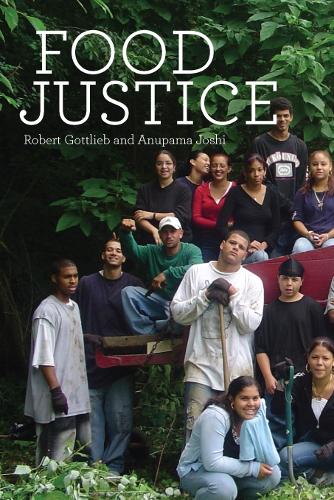
Food Justice
(Paperback)
Publishing Details
Food Justice
By (Author) Robert Gottlieb
By (author) Anupama Joshi
MIT Press Ltd
MIT Press
25th January 2013
25th January 2013
United States
Classifications
General
Non Fiction
Food security and supply
363.8
Physical Properties
Paperback
320
Width 152mm, Height 229mm, Spine 19mm
454g
Description
The story of how the emerging food justice movement is seeking to transform the American food system from seed to table.In today's food system, farm workers face difficult and hazardous conditions, low-income neighborhoods lack supermarkets but abound in fast-food restaurants and liquor stores, food products emphasize convenience rather than wholesomeness, and the international reach of American fast-food franchises has been a major contributor to an epidemic of "globesity." To combat these inequities and excesses, a movement for food justice has emerged in recent years seeking to transform the food system from seed to table. In Food Justice, Robert Gottlieb and Anupama Joshi tell the story of this emerging movement. A food justice framework ensures that the benefits and risks of how food is grown and processed, transported, distributed, and consumed are shared equitably. Gottlieb and Joshi recount the history of food injustices and describe current efforts to change the system, including community gardens and farmer training in Holyoke, Massachusetts, youth empowerment through the Rethinkers in New Orleans, farm-to-school programs across the country, and the Los Angeles school system's elimination of sugary soft drinks from its cafeterias. And they tell how food activism has succeeded at the highest level- advocates waged a grassroots campaign that convinced the Obama White House to plant a vegetable garden. The first comprehensive inquiry into this emerging movement, Food Justice addresses the increasing disconnect between food and culture that has resulted from our highly industrialized food system.
Reviews
Food Justice makes a highly valuable contribution to the movement for food justice.
Christof Bernau, Human EcologyFood Justice is an eye-opening treatment of an important subject that has something to offer every reader, and will prove especially useful to those with a keen interest in learning about, and perhaps changing, where their food comes from.
Contemporary SociologyThis book is essential reading for scholars interested in the connections between food and the environment.
Kathleen A. Brosnan, Environmental HistoryThe authors excelin presenting a well-rounded picture of how food justiceand more prevalent food injusticestouches our daily lives.
Megan C. Bourke, Policy PerspectivesWhile their pragmatic and wide-ranging approach to food justice might not be appreciated by environmental purists, the authors' stock of common-sense solutions and genuine concern makes Food Justice an interesting and authoritative read. Their central argumentthat the approach to transforming the way we eat needs to be more integratedis compelling and certainly worth considering. Unfortunately injustices in the way food is produced and consumed won't go away over night. But if, as Food Justice advocates, we work together and focus on community-based initiatives, then we are on the right track.
Ruth Styles, The EcologistAuthor Bio
Robert Gottlieb is Emeritus Professor of Urban & Environmental Policy and founder and former Director of the Urban and Environmental Policy Institute at Occidental College. He is the author of Reinventing Los Angeles- Nature and Community in the Global City (MIT Press) and other books. Anupama Joshi is the Executive Director and Cofounder of the National Farm to School Network, a project of Tides Center (formerly based at the Urban & Environmental Policy Institute at Occidental College).
